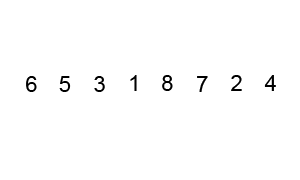Bubble Sort is the simplest sorting algorithm which compares all the adjacent elements one by one and sort them if they are in wrong order.
It is called Bubble Sort, because with each iteration the larger element in the list bubbles up towards the last (i.e in its final place).
Source: wikimedia
EXAMPLE OF BUBBLE SORT
SIMPLE BUBBLE SORT
// C program for implementation of Bubble sort #include <stdio.h> int main() { int arr[] = {6, 3, 5, 2, 8, 10, 9}; int n = sizeof(arr)/sizeof(arr[0]); int i, j,temp; //Bubble Sort starts for (i = 0; i < n-1; i++) { for (j = 0; j < n-i-1; j++) { if (arr[j] > arr[j+1]) { int temp = arr[j]; arr[j] = arr[j+1]; arr[j+1] = temp; } } } //Bubble Sort ends printf("Sorted array: \n"); for (int i=0; i < n; i++) { printf("%d ", arr[i]); } return 0; }
Sorted array:
2 3 5 6 8 9 10
MODIFIED / OPTIMIZED BUBBLE SORT
The above function always runs O(n^2) time even if the array is sorted. It can be optimized by stopping the algorithm if inner loop didn’t cause any swap.// C program for Modified/Optimized Bubble sort #include <stdio.h> int main() { int arr[] = {6, 3, 5, 2, 8, 10, 9}; int n = sizeof(arr)/sizeof(arr[0]); int i, j, temp, flag=0; //Modified Bubble Sort starts for (i = 0; i < n-1; i++) { flag=0; for (j = 0; j < n-i-1; j++) { if (arr[j] > arr[j+1]) { int temp = arr[j]; arr[j] = arr[j+1]; arr[j+1] = temp; flag=1; } } if(flag==0) { break;} } //Modified Bubble Sort ends printf("Sorted array: \n"); for (int i=0; i < n; i++) { printf("%d ", arr[i]); } return 0; }
Sorted array:
2 3 5 6 8 9 10
COMPLEXITY ANALYSIS
- Worst and Average Case Time Complexity: O(n*n). Worst case occurs when array is reverse sorted.
- Best Case Time Complexity: O(n). Best case occurs when array is already sorted.
- Auxiliary Space Complexity: O(1). Only single extra memory space is required for temp variable for swapping.



